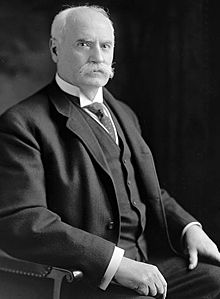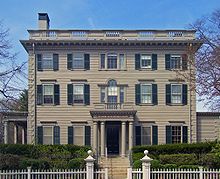Nelson W. Aldrich
Nelson Wilmarth Aldrich (born November 6, 1841 in Foster , Rhode Island , † April 16, 1915 in New York City ) was an influential American politician and from 1881 to 1911 a member of the United States Senate for Rhode Island. During the time of his membership he held the office of chairman of the Republican Party in Rhode Island for a long time . His predecessor in this position was Ambrose Burnside , and he was succeeded by Henry F. Lippitt .
Private life
Aldrich is the child of Abby Burgess (mother) and Anan E. Aldrich (father); The latter was an assistant in an industrial mill. Nelson W. Aldrich attended East Killingly, Connecticut Public School and the Academy of East Greenwich . He first worked as a retailer and entrepreneur before moving into politics. During the Civil War served Aldrich 1862-1865 as private ( private first class ) in Rhode Iceland National Guard .
Aldrich married Abigail "Abby" Pearce Truman Chapman on October 9, 1866, who came from a wealthy family. Pearce Truman Chapman and Nelson W. Aldrich's daughter Abby Greene Aldrich (1874-1948) married on October 9, 1901 in Warwick Neck (Rhode Iceland) John D. Rockefeller, Jr. , the only son of the then richest man in the world, John D Rockefeller . Their son Nelson Rockefeller was for a long time Governor of New York and later Vice President of the United States under Gerald Ford .
Winthrop W. Aldrich (* 1885), another son of Pearce Truman Chapman and Nelson W. Aldrich, became a banker at Chase Manhattan Bank (most recently a board member) and the United States' ambassador to Great Britain. The director Robert Aldrich (1918–1983) was a grandson of Nelson W. Aldrich.
From around 1906 Aldrich mainly made investments / stock deals (e.g. Rhode Island street railway system ; mining and rubber industry in the Belgian Congo ).
Political life and work
Aldrich's political life began with the election to the Providencer city council ( city council ) in 1869; from 1872 to 1873 he was its president. He was elected to the Rhode Island House of Representatives from 1875 to 1876 and was speaker of the House in 1876 .
As a "Congressman" for the state of Rhode Island (March 4, 1879 to October 4, 1881) he was elected for the Republicans in the House of Representatives of the United States . After the death of Ambrose E. Burnside, he succeeded him as Senator on October 4, 1881 and was able to expand his political influence to the federal level. He was re-elected in 1886, 1892, 1898, and 1904.
Aldrich Vreeland Act
The Aldrich-Vreeland Act was passed by the government of Theodore Roosevelt on May 30, 1908 in response to the panic of 1907 . The law allowed national banks to form national currency associations in groups of ten or more with a total capital of at least $ 5,000,000 to issue emergency money. These banknotes were backed not only by government bonds (states, cities, and counties), but also by all securities that the banks held. The law stipulated that the Comptroller of the Currency who distributed this emergency money had to obtain the approval of the responsible persons of the currency associations. The proposed measure was intended to bring more money into circulation as a short-term aid to encourage ongoing lending. However, the emergency money was never issued.
Senator Nelson W. Aldrich was largely responsible for the Aldrich-Vreeland Monetary Act and became chairman of the National Monetary Commission. The law also allows senators and congressmen to interfere in banking affairs. In 1914, the law was amended and expanded by Congress.
Protective Tariffs and Payne-Aldrich Tariff Act
The influential Senator from Rhode Island had a long history of securing high protectionist tariffs. In 1883 he participated in the obstruction of a reform law, a very limited "Mongrel Tariff" was the result. In 1890 he was a driving force behind the adoption of the McKinley Tariff, which raised tariffs to 48%, the highest level in American history to date. Four years later he worked with other protectionists to undermine the Democratic reforms with their significant Wilson-Gorman Tariff of 1894 and then he voted for the Dingley Tariff Act in 1897, which brought tariffs to an average of 46%.
In the 1908 election campaign the Republicans had pledged to cut tariffs, and to this end the newly elected President William H. Taft (1909) called the Congress to a special session. The tariff bill prepared by Senator Sereno E. Payne provided for tariff reductions for the import of raw materials, while he maintained protective tariffs for imported finished products. This met with massive protests from within the Republican ranks. Here the “insurgents” (progressives) and “standpatters” (conservatives) clashed. Senator Aldrich, who was the chairman of the finance committee and Republican majority leader, changed the bill to cut 650 tariffs and raise 220, while 1,150 remained unchanged. The only concession was to include a corporation tax in the final version. A closer study of the details of the 300-page document by the tariff reformers should be prevented, so that a quick coordination was necessary. On July 30, the House of Representatives passed the Payne-Aldrich bill with 195 votes to 183. 20 Republicans had voted against with the Democrats. On August 5, the Senate passed the bill with 47 votes to 31, with ten more “no” votes from Republicans. The President signed the Payne-Aldrich Bill on August 6, 1909. He then toured the country and proclaimed the cut in tariffs to an average of 41% as the best bill Republicans had ever passed. In reality the overall rates had only been reduced by 5%, while the protective tariffs for imports of e.g. B. Coal and iron ore were even increased ( protectionism ).
Also in 1909, he introduced the 16th Amendment to the Constitution of the United States ( 16th Constitutional amendment to establish an income tax ) in the legislative process to create an income tax ; ten years earlier, a similar legislative initiative had been classified as communist and rejected.
In 1910 he secretly prepared the bill for the Federal Reserve Act together with six other people (→ Jekyll Island Club ). In the 61st Congress 2nd Session, Aldrich, as chairman of the National Monetary Commission, presented Document No. 538 to the Senate, prepared by Oliver Mitchell Wentworth Sprague, a respected financial expert.
Aldrich was a member and chairman of various committees in the Senate. He chaired the United States Senate Committee on Finance (1899–1911), United States Senate Committee on Transportation Routes to the Seaboard (1883–1887), United States Senate Committee on Rules (1874–1947), and United States Senate Select Committee on Corporations Organized in the District of Columbia (1893–1895). He also served as chairman ( chairman ) of the Republican Conference of the United States Senate .
From 1908 to 1912 he was chairman of the National Monetary Commission .
Summary of important political offices:
- Member of the US House of Representatives for Rhode Island, 1st District 1879–1881
- 1881–1911 United States Senator ( Class 1 ) for Rhode Island
- 1899–1911 Chairman of the US Senate Committee on Finance (Finance Committee)
Others
Aldrich was a member of the Freemasons ; he was also Treasurer ( Treasurer ) of the Grand Lodge of Rhode Iceland .
The Nelson W. Aldrich House in Providence (110 Benevolent Street) is now a museum administered by the Rhode Iceland Historical Society . It was declared a National Historic Landmark in 1976 .
Aldrich died in New York City at the age of 73. He is buried in Swan Point Cemetery in Providence.
See also
literature
- Nelson Wilmarth Aldrich: Banking Reform in the United States (1914). New edition. Publisher: Kessinger Pub Co (May 22, 2010) ISBN 978-1161747782
- American National Biography; Dictionary of American Biography; Stephenson, Nathaniel W., Nelson W. Aldrich: A Leader In American Politics , New York City, C. Scribners Sons, 1930. Reprint. New York: Kennikat Press, 1971 → online
- Sternstein, Jerome L., "Corruption in the Gilded Age Senate: Nelson W. Aldrich and the Sugar Trust." Capitol Studies 6 (Spring 1978): p. 13-37.
Web links
- Nelson W. Aldrich in the Biographical Directory of the United States Congress (English)
- Nelson Wilmarth Aldrich - Biography
References and comments
- ↑ bioguide.congress.gov
- ↑ other information: "Tenth Rhode Island Volunteers" Nelson W. Aldrich in the Notable Names Database (English)
- ↑ www.spartacus.schoolnet.co.uk
- ^ Terms of office of Aldrich
- ^ The Aldrich – Vreeland Act Law & Definition
- ↑ McKinley Tariff
- ↑ Harper's Weekly, September 8, 1894
- ^ Dingley Tariff Act
- ^ Definition of insurgents
- ↑ Definition of Standpatters
- ↑ Harper's Weekly October 2, 1909
- ↑ Oliver Mitchell Wentworth Sprague: History of Crises under the National Banking.
- ↑ Encyclopædia Britannica (Eng.)
- ↑ Nelson W. Aldrich in the Notable Names Database (English)
| personal data | |
|---|---|
| SURNAME | Aldrich, Nelson W. |
| ALTERNATIVE NAMES | Aldrich, Nelson Wilmarth (full name) |
| BRIEF DESCRIPTION | American politician |
| DATE OF BIRTH | November 6, 1841 |
| PLACE OF BIRTH | Foster , Rhode Island |
| DATE OF DEATH | April 16, 1915 |
| Place of death | New York City |



